
Michael Francis Foley is an American retired professional wrestler and author. He is signed to WWE under the company's "Legends" program, acting as a company ambassador.

In professional wrestling, blading is the practice of intentionally cutting oneself to provoke bleeding. It is also known as "juicing", "gigging", or "getting color". Similarly, a blade is an object used for blading, and a bladejob is a specific act of blading. The act is usually done a good length into the match, as the blood will mix with the flowing sweat on a wrestler's brow to make it look like much more blood is flowing from the wound than there actually is. The preferred area for blading is usually the forehead, as scalp wounds bleed profusely and heal easily. Legitimate, unplanned bleeding which occurs outside the storyline is called "juicing the hard way".

Andrew James Robert Patrick Martin was a Canadian professional wrestler and actor. He was best known for his time with the World Wrestling Federation/Entertainment (WWF/WWE) under the ring name Test.

Terrance Dee Funk was an American professional wrestler. Considered one of the greatest professional wrestlers of all time, Funk was known for the longevity of his career – which spanned more than 50 years and included multiple short-lived retirements – and the influential hardcore wrestling style he pioneered in the latter part of his career.
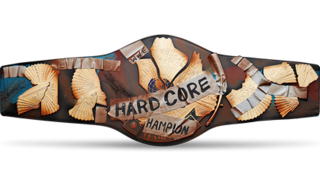
The WWE Hardcore Championship was a hardcore wrestling championship in WWE which was contested under "hardcore" rules. In the latter part of the title's history, a rule was implemented allowing anyone to challenge the champion at any place or time, provided a referee was present. It is considered one of the most defining titles of the Attitude Era. It was established on November 2, 1998, with Mankind as the inaugural champion. In 2002, it was unified with the WWE Intercontinental Championship by Rob Van Dam, the final Hardcore Champion.

Allen Ray Sarven is an American professional wrestler, better known by his ring name Al Snow. He is best known for his tenures in Extreme Championship Wrestling and WWF/E. Snow has also held various backstage positions for professional wrestling promotions. Snow worked as a road agent for Total Nonstop Action Wrestling from 2010 to 2017 and has owned Ohio Valley Wrestling since 2018.
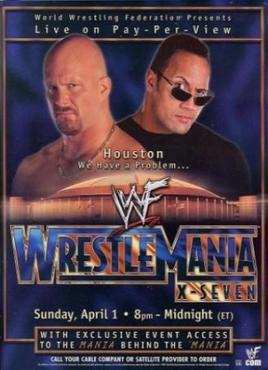
WrestleMania 17 was the 17th annual WrestleMania professional wrestling pay-per-view (PPV) event produced by the World Wrestling Federation (WWF). It took place on April 1, 2001, at the Reliant Astrodome in Houston, Texas. It was the first WrestleMania held in the state of Texas. Twelve matches were contested at the event, including one broadcast exclusively on the Sunday Night Heat pre-show.
Steve Blackman is an American martial arts instructor, bail bondsman, and former professional wrestler. He is best known for his appearances with the World Wrestling Federation (WWF) from 1997 to 2002, where he was a frequent challenger for the promotion's mid-card titles. He held the WWF Hardcore Championship six times and holds the record for most combined days as champion, a total of 172 days.
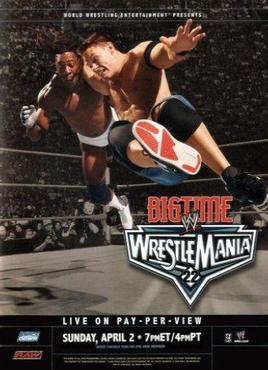
WrestleMania 22 was the 22nd annual WrestleMania professional wrestling pay-per-view (PPV) event produced by World Wrestling Entertainment (WWE). It was held for wrestlers from the promotion's Raw and SmackDown! brand divisions. The event took place on April 2, 2006, at the Allstate Arena in the Chicago suburb of Rosemont, Illinois.

The Corporation was a heel stable in the late 1990s in the Attitude Era in the World Wrestling Federation.

WrestleMania 16 was the 16th annual WrestleMania professional wrestling pay-per-view (PPV) event produced by the World Wrestling Federation (WWF). It took place on April 2, 2000, at the Arrowhead Pond of Anaheim in Anaheim, California. A total of nine matches were contested on the event's card.
Jason Arhndt is an American retired professional wrestler. He is best known for his appearances with the World Wrestling Federation (WWF) under the ring name Joey Abs as part of the Mean Street Posse. He also performed using the ring name Venom.

Beyond the Mat is a 1999 American documentary film directed, written, produced and narrated by Barry W. Blaustein. The film focuses on the lives of professional wrestlers outside of the ring, primarily Mick Foley, Terry Funk, and Jake Roberts, as well as some aspiring wrestlers. It focuses on the World Wrestling Federation (WWF), Extreme Championship Wrestling (ECW) during its rise in popularity, and many other independent wrestlers and organizations. The film was originally released in U.S. theaters in March 2000, and later on VHS and DVD.

Have a Nice Day!: A Tale of Blood and Sweatsocks is an autobiography of former wrestler Mick Foley. It details his life all the way from his upbringing in New York to winning the WWF Championship from The Rock in December 1998. Foley had originally wanted the book to be called simply Blood and Sweatsocks, but this was eschewed in favor of his long-time catchphrase Have a Nice Day!, with the former being worked into the sub-title. The book debuted at #3 on the New York Times Best Seller List on November 7, 1999 and reached #1 on December 5.

Foley Is Good: And the Real World Is Faker Than Wrestling is the second autobiography (2001) of wrestler Mick Foley, formerly of WWE and TNA. It details his career from January 1999 until his retirement in April 2000 at WrestleMania 2000.

The 1998 Royal Rumble was the 11th annual Royal Rumble professional wrestling pay-per-view (PPV) event produced by the World Wrestling Federation. It took place on January 18, 1998, at the San Jose Arena in San Jose, California. Six matches were contested on the event's card. As has been customary since 1993, the Royal Rumble match winner received a world championship match at that year's WrestleMania. For the 1998 event, the winner received a match for the WWF Championship at WrestleMania XIV.
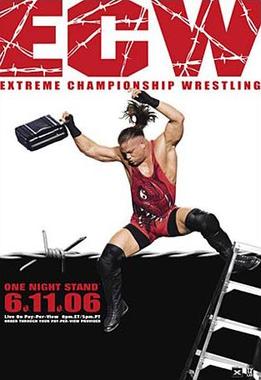
The 2006 ECW One Night Stand was the second annual One Night Stand professional wrestling pay-per-view (PPV) event produced by World Wrestling Entertainment (WWE). It was held on June 11, 2006, at the Hammerstein Ballroom in the Manhattan borough of New York, New York. Like the previous year's event, although wrestlers from WWE's Raw and SmackDown! brand divisions had appeared on the show, it was primarily held as a reunion show for wrestlers from the former Extreme Championship Wrestling (ECW) promotion, the assets of which WWE acquired in 2003. Just prior to the event, WWE also established a third brand dubbed ECW for wrestlers of the former promotion and newer talent. The event was in turn WWE's first PPV to feature the ECW brand.
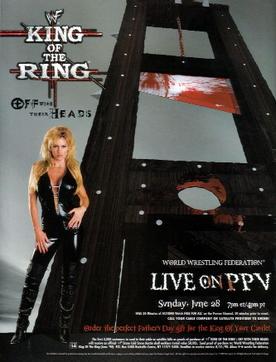
The 1998 King of the Ring was the sixth annual King of the Ring professional wrestling pay-per-view (PPV) event produced by the World Wrestling Federation that featured the 12th King of the Ring tournament. It took place on June 28, 1998, at the Pittsburgh Civic Arena in Pittsburgh, Pennsylvania.

The Attitude Era was a major era of professional wrestling within the World Wrestling Federation. The term "WWF Attitude" was used to describe its programming from November 9, 1997, to May 6, 2002. It began during the Monday Night Wars, a period in which WWF's Monday Night Raw went head-to-head with World Championship Wrestling's (WCW) Monday Nitro in a battle for Nielsen ratings each week from September 4, 1995, to March 26, 2001. In June 1996, Stone Cold Steve Austin became King of the Ring, defeating Jake Roberts in the tournament final. To cap off the victory, Austin delivered his “Austin 3:16" promo, starting the buildup to the Attitude Era. The era was officially initiated on November 9, 1997, at Survivor Series 1997, when a video package aired ending with the first use of the "WWF Attitude" scratch logo; this was immediately before the main event featuring Bret Hart vs. Shawn Michaels, which retrospectively would be known as the Montreal Screwjob due to the match's controversial finish. WWF's programming in this era featured adult-oriented content, which included increased depicted violence, profanity, and sexual content. This era was part of a wider surge in the popularity of professional wrestling in the United States and Canada as television ratings and pay-per-view buy rates for WWF and its rival promotions saw record highs.

Mankind vs. The Undertaker was a professional wrestling match between Mankind and The Undertaker of the then-World Wrestling Federation (WWF), and took place inside a Hell in a Cell, a 16 feet (4.9 m) high steel cage structure with a roof. It was the third Hell in a Cell match in history, and took place at the King of the Ring pay-per-view on June 28, 1998, at the Civic Arena in Pittsburgh, Pennsylvania. Though the match had received little build in the way of storytelling before the event due to the unpredictability of the WWF's Attitude Era, the two characters had an extensive backstory that motivated both performers heading into the match.



















